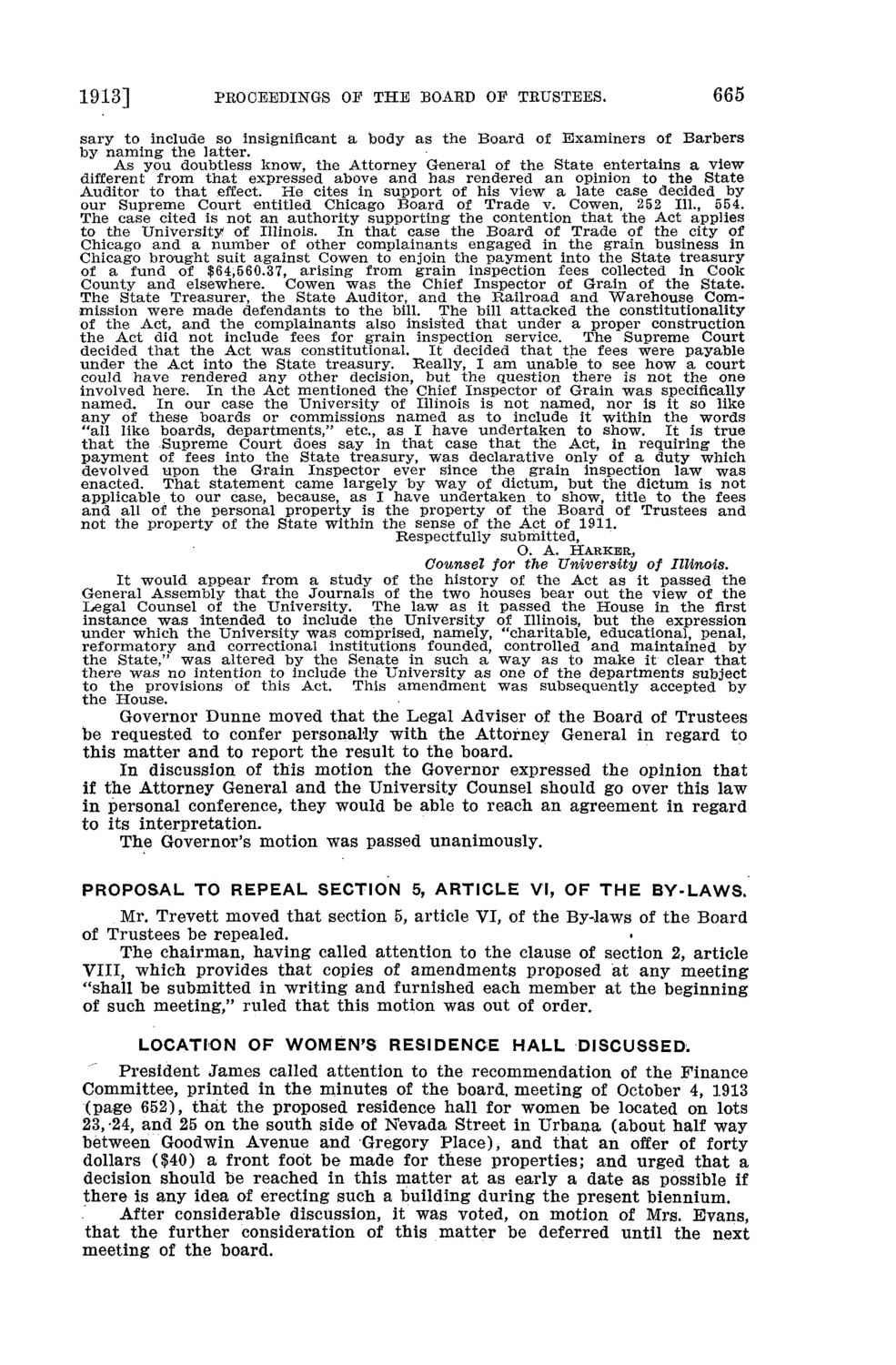| |
| |
Caption: Board of Trustees Minutes - 1914
This is a reduced-resolution page image for fast online browsing.

EXTRACTED TEXT FROM PAGE:
1913] PROCEEDINGS OF THE BOAED OF TRUSTEES. 665 sary to include so insignificant a body as the Board of Examiners of Barbers by naming the latter. As you doubtless know, the Attorney General of the State entertains a view different from that expressed above and has rendered an opinion to the State Auditor to that effect. He cites in support of his view a late case decided by our Supreme Court entitled Chicago Board of Trade v. Cowen, 252 111., 554. The case cited is not an authority supporting the contention that the Act applies to the University of Illinois. In that case the Board of Trade of the city of Chicago and a number of other complainants engaged in the grain business in Chicago brought suit against Cowen to enjoin the payment into the State treasury of a fund of $64,560.37, arising from grain inspection fees collected in Cook County and elsewhere. Cowen was the Chief Inspector of Grain of the State. The State Treasurer, the State Auditor, and the Railroad and Warehouse Commission were made defendants to the bill. The bill attacked the constitutionality of the Act, and the complainants also insisted that under a proper construction the Act did not include fees for grain inspection service. The Supreme Court decided that the Act was constitutional. It decided that the fees were payable under the Act into the State treasury. Really, I am unable to see how a court could have rendered any other decision, but the question there is not the one involved here. In the Act mentioned the Chief Inspector of Grain was specifically named. In our case the University of Illinois is not named, nor is it so like any of these boards or commissions named as to include it within the words "all like boards, departments," etc., as I have undertaken to show. It is true that the Supreme Court does say in that case that the Act, in requiring the payment of fees into the State treasury, was declarative only of a duty which devolved upon the Grain Inspector ever since the grain inspection law was enacted. That statement came largely by way of dictum, but the dictum is not applicable to our case, because, as I have undertaken to show, title to the fees and all of the personal property is the property of the Board of Trustees and not the property of the State within the sense of the Act of 1911. Respectfully submitted, Counsel for the University of Illinois. It would appear from a study of the history of the Act as it passed the General Assembly that the Journals of the two houses bear out the view of the Legal Counsel of the University. The law as it passed the House in the first instance was intended to include the University of Illinois, but the expression under which the University was comprised, namely, "charitable, educational, penal, reformatory and correctional institutions founded, controlled and maintained by the State," was altered by the Senate in such a way as to make it clear that there was no intention to include the University as one of the departments subject to the provisions of this Act. This amendment was subsequently accepted by the House. Governor Dunne moved that the Legal Adviser of the Board of Trustees be requested to confer personally with the Attorney General in regard to this matter and to report the result to the board. In discussion of this motion the Governor expressed the opinion that if the Attorney General and the University Counsel should go over this law in personal conference, they would be able to reach an agreement in regard to its interpretation. The Governor's motion was passed unanimously. PROPOSAL TO REPEAL SECTION 5 ARTICLE VI, OF T H E BY-LAWS. , Mr. Trevett moved that section 5, article VI, of the By-laws of the Board of Trustees be repealed. The chairman, having called attention to the clause of section 2, article VIII, which provides that copies of amendments proposed at any meeting "shall be submitted in writing and furnished each member at the beginning of such meeting," ruled that this motion was out of order. LOCATION OF WOMEN'S RESIDENCE HALL DISCUSSED. President James called attention to the recommendation of the Finance Committee, printed in the minutes of the board, meeting of October 4, 1913 (page 652), that the proposed residence hall for women be located on lots 23, -24, and 25 on the south side of Nevada Street in Urbana (about half way between Goodwin Avenue and Gregory Place), and that an offer of forty dollars ($40) a front foot be made for these properties; and urged that a decision should be reached in this matter at as early a date as possible if there is any idea of erecting such a building during the present biennium. After considerable discussion, it was voted, on motion of Mrs. Evans, that the further consideration of this matter be deferred until the next meeting of the board. O. A. BARKER,
| |